Is “The Prestige” Christopher Nolan’s unloved masterpiece?
For it is a masterpiece and here’s why.
For it is a masterpiece and here’s why.
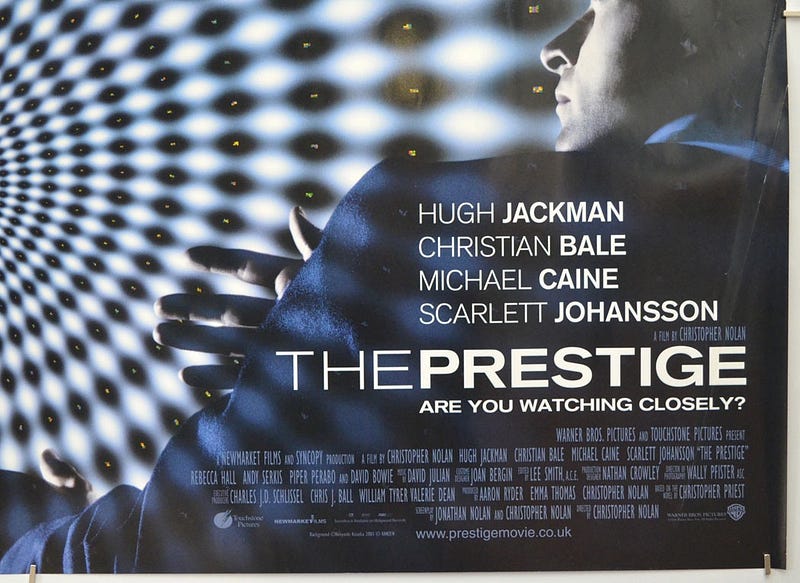
“Are you watching closely?”
The film review that follows was originally written nearly a decade ago and resides within my opus love in article on the entire film career of director Christopher Nolan which can be found elsewhere within my archives. After originally penning this review sometime in 2013 and then updating it fully with the then future releases of the magical Interstellar a year later, the wonderful Dunkirk in 2017 and the frustrating annoyance that was Tenet in 2020, last night I turned out all the lights after thinking about David Bowie for some unexplainable reason and watched this masterpiece, for that is what it is, yet again. Without wishing to send your eyes immediately to the bottom of the page and missing my near decade old spoiler free treatise on this film, here’s how I concluded my original article all those years ago:
“However, this film is a real treat and a cinematic masterpiece that never ages”.
And last night, in the pitch black magical madness that a late night film truly demands, The Prestige hadn’t aged, remains a real treat and should rightly be afforded the tag of masterpiece and also, arguably, the English born director’s finest ever work.
To do so would be to stand this film up against his seven other films not previously outlined above and the competition is incredibly strong. His debut cinematic film Following in 1998 was a black and white 60 minute curiosity and whilst not great or particularly exciting, it was the absolute template and precursor to his first masterpiece two years later and Memento. Black and White. Forward and Reverse. Colour. Back to Black and White. A conundrum that appears an easy riddle to solve and which leaves you with an even bigger riddle at the end, Memento is genius stuff and so is the star turn from Guy Pierce in the film’s headline role. It’s also a continuation (of sorts) of the central themes that run through Nolan’s films and primarily the huge theme of time that he plays with and twists with absolute abandon. We’ll return to the theme of time if I remember, but I have short term memory loss. I think that’s also one of the main central themes of his films too, memory, but I can’t remember.
I’m sorry, have we had this conversation before?
Two years later, Insomnia became arguably his first unloved film and perhaps the openness of the story killed any required suspense. But that’s to overlook the incredible performance from Hilary Swank and a quiet, shy and menacingly distant performance from the genius that was Robin Williams, and in the same year he did likewise in the arguably better One Hour Photo directed by Mark Romanek. Then came the Batman (his Batman) trilogy with The Prestige and Interstellar sandwiched in between and whilst the third of the hat-trick of films from Gotham City was as muddled and unintelligible as Tom Hardy in his “Bane” mask, the middle film was all Heath Ledger’s tragic “Joker” role and Batman Begins was a very high point the rest of the trilogy couldn’t quite meet.
Masterpieces? Memento, The Prestige and Inception certainly and there’s also an argument to be made for Interstellar (a stretch) but less so for Dunkirk which, through the prism of time and the directorial lens of Christopher Nolan, wraps up three interweaving timelines which seep and bleed further and further into each other and all in under two cinema hours.
I adore the films of Christopher Nolan, I’m intrigued as to how he’s attacking the subject of Robert J Oppenheimer for his next film scheduled for release next year and whilst I don’t particularly care for Tenet (and couldn’t explain it to you if you gave me a thousand years), there are three arguable masterpieces in the ten films that precede it.
Is The Prestige a masterpiece? Is it unloved? It is now overshadowed by the behemoth films that have followed it? “Perhaps” could well be the answer to all three questions. I was going to argue to a far lengthier degree as to the veracity of my masterpiece argument but I won’t. I’ll leave my nine year old words below to whet your appetite if you’ve stumbled here by accident and haven’t yet seen this incredible creation from the London born film director yet and who resides in third place on my all time favourite director list behind The Coen Brothers and Quentin Tarantino.
Resentment. Anger. Jealousy. Remorse. Regret. Envy. Duplicity. Secrecy.
Love. Loss. Life. Death. The dimensional unknown.
Curiosity. Exploration. Subterfuge. Magic. Illusion.
Desire. A lifetime ambition. A unique gift.
A unique ageless and legacy defining magic trick that will define a showman.
And time. Time. Time. Time.
It’s no surprise therefore that I adore the film’s and themes of Christopher Nolan as avidly as I adore that greatest of all showmen, the creator of his own living legend and legacy and the proponent of time being as liquid and fluid and elastic and unrealistic as it ludicrously is, Salvador Dali. Time is the biggest of all illusions and the magic trick no longer needs any further reinforcement. We are governed by time and I use the word “governed” very deliberately. A world without time? Anarchy and societal disorder, right? Absolutely! But the Phoenix that rises from the ashes of our already broken society wouldn’t be chained to a manmade construct anymore. We’ll deal with the anarchy, but imagine the freedom and liberation!
“What’s the time Bob?”
“Fucked if I know, Sandy. Nor do I care. Shall we go to the beach and skip some stones and watch the sunset?”
Anyway…….
“Are you watching closely?”
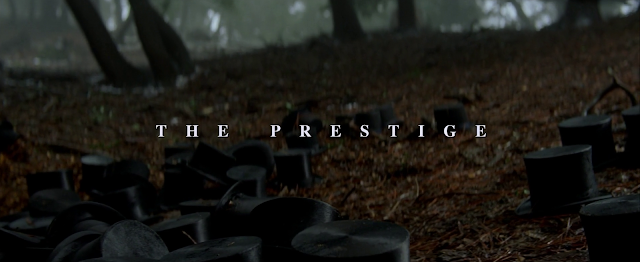
“Every magic trick consists of three parts or acts. The first part is called The Pledge. The magician shows you something ordinary, a deck of cards, a bird or a man. He shows you this object, perhaps asks you to inspect it to see that it is indeed real”.
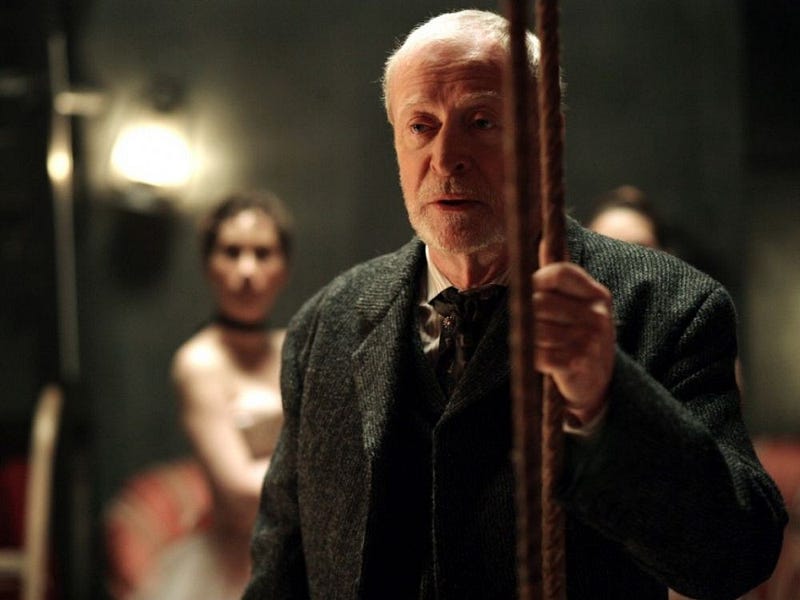
“But of course, it probably isn’t. The second Act is called The Turn. The Magician takes the ordinary something and makes it do something extraordinary. Now, you’re looking for the secret, but you won’t find it because of course, you’re not really looking. You don’t really wanna know. You want to be fooled. But you won’t clap yet”.
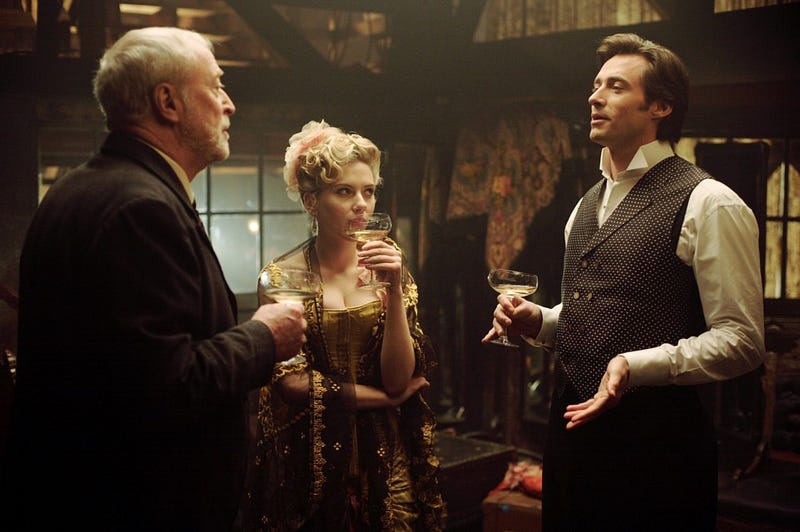
“Because making something disappear isn’t enough. You have to bring it back. That’s why every magic trick has a third Act. The hardest part.
The part we call The Prestige”.
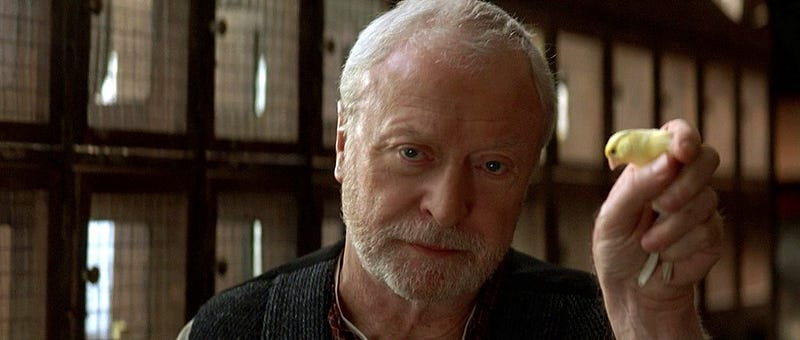
With so many twists and turns and unexpected events, this is another masterpiece that is difficult to describe and do justice to without spoilers, so please bear with me as I try! And as I say so many times to so many people, if you haven’t seen this film before, you simply have to. And you’ll watch again and again as you piece together the multitude of little hints and nods as you watch for a second, third or fourth time. It’s a multi layered treat of a film with some stand out performances which I’ll come to after a brief admission as to my own obsession with magic, tricks and illusions. I’ve always been obsessed by magic from an early age but of recent times David Blaine and particularly Derren Brown are my heroes in this regard as they continually produce illusions and tricks that truly boggle the mind and have you grasping for the reason or The Prestige. It truly brings out the child in me and fascinates and perplexes me in equal measure.
And for that I’m forever thankful.
And it’s never quite what you expected, is it?. Anyway…….
Starting with the cast, and what a stellar cast it is. Some of the best character actors of our generation are here: Christian Bale, Michael Caine, Hugh Jackman, Scarlett Johansson and Andy Serkis ably supported by Piper Perabo, Rebecca Hall and a scene stealing cameo from David Bowie. To the screenplay: written by Christopher and his brother Jonathan based on Christopher Priest’s novel of the same name. Wally Pfister is again masterly as Director of Photography, and David Julyan again returns to provide a haunting score throughout. The closing credits play out with Thom Yorke’s great song “Analyse” and how very, very apt.
But we’re getting ahead of ourselves.
The film opens with the very premise of the whole movie, that every magic trick or illusion comes in three parts or acts. Part one is The Pledge, two is The Turn and three is The Prestige. Quickly this is shown through edited snippets of various different tricks showing the three acts but before you can fully absorb this process, the film moves quickly to a court scene, describing in detail how such a past act had gone horribly wrong. This court scene is near present day, but set around the turn of the 20th Century. The continuous back story is provided by an intense narration and the reading of two diaries, from two different characters, in two very different locations and circumstances. Often cut between the two characters, writing and reading the diaries, the outline detail is provided, but this is very much just the beginning. From the ill fated trick onward, the film constantly deceives you, delights you, pleases you, challenges you and can often break your heart.
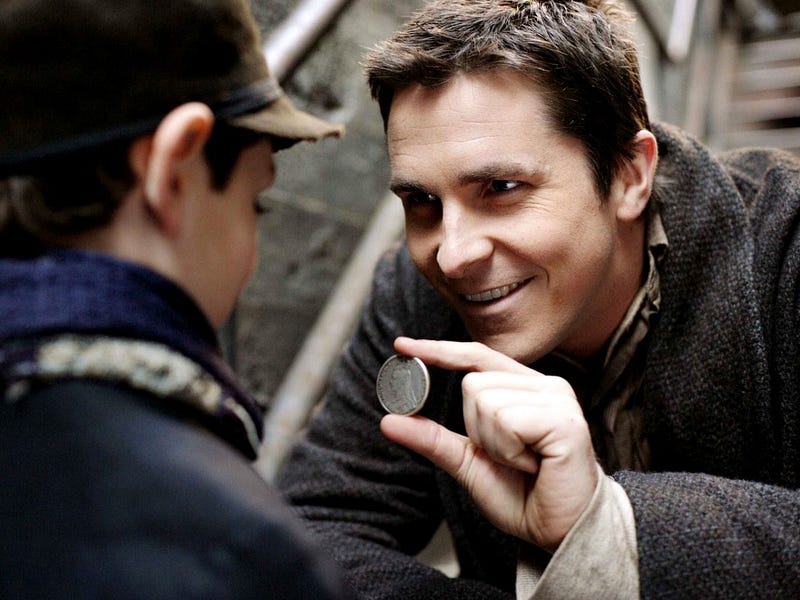
The ill fated trick splits the friendship of two magicians. “Alfred Borden” (yet another powerful performance from Christian Bale) and “Robert Angier” (a stylish Hugh Jackman). Friends and rivals, they are seeking the ultimate illusion and are surrounded by equally rich in depth characters. “Cutter” sees Michael Caine as a magician’s Ingenieur, a creator of the physical aspects to the illusions, and Caine is brilliant throughout. “Olivia”, a magician’s assistant is played brilliantly by the underrated Scarlett Johansson and completing the triumvirate of wonderful female supporting roles (in a very much male dominated film) is “Julia” played by Piper Perabo and “Sarah” by a brilliant Rebecca Hall.
Character detail has been left deliberately vague so as to not hint at potential spoilers. There are two further performances worthy of note: “Alley” sees Andy Serkis on top form, assisting “Nikola Tesla”, with David Bowie in a stunning cameo. The minor drawback here are the scant few scenes with Bowie, who is flawless. It’s also interesting to note how Nikola Tesla leaves our screens and cue the age old conspiracy theory! But there’s far more fact than fiction (or indeed “Theory”) where this is concerned, but I’ll leave that for another day. Rather, here’s a brief dissection of his two albeit brief scenes:
Angier is striding purposefully towards Nikola Tesla’s mountainside retreat after finally securing a desired audience with the inventor. Entering his “workshop” he is greeted by an electrical current running throughout the room and especially in the corner of the room and looks aghast. Alley, reassures him “It’s perfectly safe”.
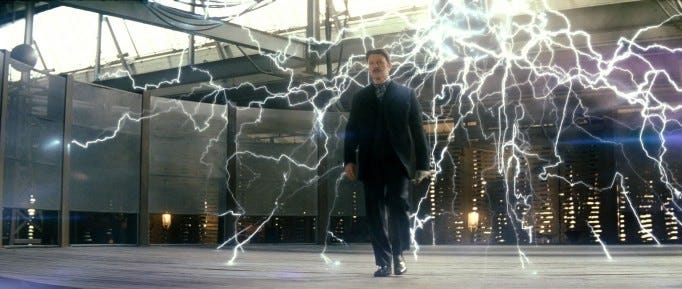
Shortly thereafter, Tesla comes striding through the electrical current and greets Angier with a firm handshake after complimenting him on his magic shows. He then shows Angier an example of what is possible as they hold hands again, with Angier’s free hand holding an unconnected light bulb: “What’s conducting the electricity?” asks an astonished Angier to which Tesla’s reply is a simple “Our bodies, Mr Angier, are quite capable of conducting and indeed producing energy”.
A brief cut scene follows as all three men enjoy lunch on a balcony enjoying the hills and mountains that surround them. Alley is only briefly in shot whilst the camera is continually back and forth between Tesla and Angier as they tellingly discuss love, dreams, their obsessions, their life’s work and of course Angier’s request for Tesla to build the ultimate illusion machine, his purpose for being here today. Before we reach this conclusion and the end of a very short scene, David Bowie steals the scene brilliantly:
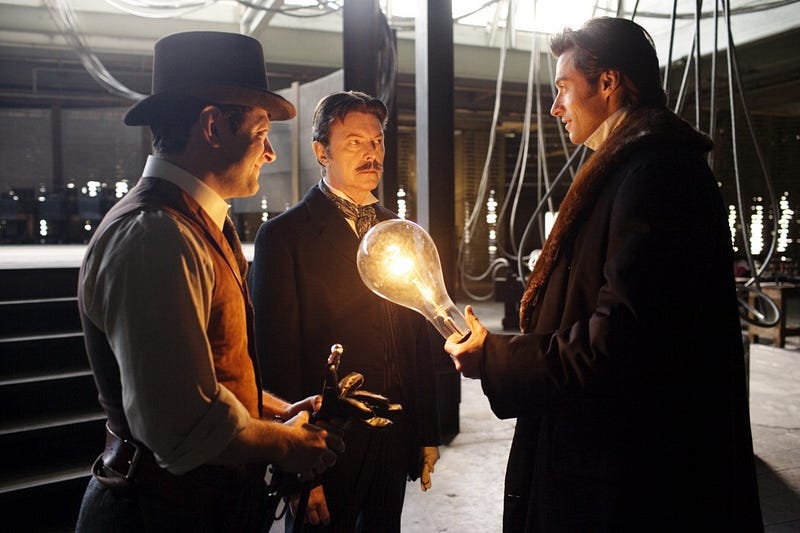

A film of constant deception, of obsessively striving for that one unique trick, of envy and how that eats away at the soul. It’s also a further, and indeed heightened take on the question of does the end justify the means? It can also be viewed as a tale of redemption, but ultimately it’s a tale of broken friendships and a total devotion to the art of magic and producing a unique illusion. The rivalry throughout even encompasses that of Tesla and his competitor Thomas Edison but it centre’s on a working class magician prepared to “get his hands dirty” and that of an aristocratic showman seeking the adulation of the crowd for his one, ultimate unique trick.
Christopher Nolan infuses his own devotion to the art of film making here, to bring us a film so unique, so well told, so well layered and so beautifully shot and captured that it remains a joy to watch, and watch again. Both Wally Pfister (Cinematography) and Kevin Kevanaugh (Art Direction) were nominated for Oscars, both ultimately losing out.
However, this film is a real treat and a cinematic masterpiece that never ages.
Thanks for reading. This is a one off edition simply because I watched it last night and couldn’t resist rambling on and on about it again!
There’s over 100 articles detailing well in excess of 300/400 separate film reviews within my archives or alternatively, here are the three most recently published, all spoiler free:
“Nope” (2022)
Twisted Spaghetti Western. With added Aliens.medium.com
“Prey” (2022)
“If it bleeds, we can kill it”medium.com
“King Richard” (2021)
Will Smith before he gave Chris Rock a forehand smashmedium.com



